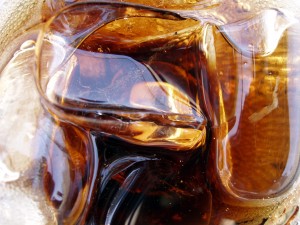
Caffeine linked to increased soft drink consumption, but industry says Deakin study is ‘flawed’
A study that links caffeine with increased consumption of soft drinks is ‘flawed’, according to the body representing Australian drinks manufacturers, the Australian Beverages Council.
The research from Deakin University’s Centre for Physical Activity and Nutrition Research (C-PAN), published in the British Journal of Nutrition, found that people drinking caffeinated drinks consumed much more than those who drank non-caffeinated equivalents.
“This research supports the ongoing need for caffeine to be tightly regulated as an additive in the food supply, as it appears an ingredient for overconsumption,” said the study’s senior author Associate Professor Lynn Riddell. “The increasing consumption of nutrient poor, high energy foods and drinks is a major contributor to the continuing problems of overweight and obesity,” she said.
Caffeine is a widely consumed, mildly addictive chemical that occurs naturally in coffee, tea and chocolate, but is an additive in soft drinks—mostly cola flavoured and energy drinks. It is estimated that more than 60 per cent of soft drink consumption is of the caffeinated variety.
Study method
The C-PAN study involved 99 participants, aged 18—30, who were randomly assigned to either a caffeinated or non-caffeinated soft drink group. The participants were masked to the true purpose of the study, being told that it was about testing the palatability and liking of a lemon flavoured soft drink. Over the 28-day intervention they consumed as much of the soft drinks as they wanted. The amount of soft drinks consumed was monitored daily while their liking of the drinks was assessed at the beginning and the end of the study.
The results of the study showed that the participants in the caffeinated drinks group drank 419ml (785 kilojoules) per day, significantly more than those in the non-caffeinated group who drank 273ml (512 kilojoules).
“Our findings clearly show that caffeine as an additive in soft drinks increased consumption and with it sugar calories, and that is a significant public health issue given the prevalence of obesity,” Associate Professor Riddell said.
No flavour difference between caffeinated and non-caffeinated drinks, major finding
As with previous CPAN research, a separate group of trained flavour testers found no difference in the flavour between the caffeinated and non-caffeinated drinks.
Large soft-drink manufacturers claim that caffeine is added as a flavour enhancer, however, the researchers said this claim was “challenged” by this research.
“Participants cannot taste the difference between the caffeinated soft drink and the non-caffeinated soft drink; if you can’t tell a difference in flavour there is no flavour activity,” said the study’s lead author Professor Russell Keast. “It is also important to note that the level of caffeine in the soft drinks used in the study was the same as in commercially available cola flavoured beverages,” he said.
“That caffeinated soft drinks were also more liked than the non-caffeinated soft drink at the end of the intervention, supports previous studies that suggest caffeine promotes liking and consumption via sub-conscious influences that may be related to reversing caffeine withdrawal symptoms,” Professor Keast said.
Professor Keast said “additive compounds such as caffeine that promote consumption via sub-conscious effects work against efforts to minimise energy consumption”.
The research provides evidence in support of the need for strong regulation of caffeine as an additive to foods,” Professor Keast said.
The research was supported by a Diabetes Australia Research Trust (DART) grant.
Beverages Council says study ‘flawed’
The Australian Beverages Council, which represents the Australian soft drinks industry, said the study had “some design flaws”.
“The study of just 99 people should be kept in context of the evidence base when considering future policy settings on caffeine in drinks,” said Geoff Parker, the Beverage Council’s CEO. “The authors themselves noted the inherent design flaws and that the study could not determine any changes in BMI nor energy intake differences between the group consuming soft drinks with caffeine and those that didn’t,” he said.
“Caffeine has been consumed for hundreds of years and is found in a wide range of foods and drinks including chocolate, coffee, cakes, biscuits, ice cream, tea, pastries, flavoured milk and soft drinks,” Mr Parker said. “The use of caffeine in soft drinks in Australia as either a flavour or functional ingredient is strictly controlled which compares to little or no regulation when it comes to other products,” he said.
Mr Parker said recent research had found that the soft drink category had “undergone a fundamental shift in the past 15 years and now nearly one in two drinks consumed are non-sugar varieties, compared to 30 per cent in 1997”.
“As a result, sugar contribution from carbonated soft drinks has dropped between 1997 and 2011 by 26 per cent per capita as consumers switch from sugar-sweetened to non-sugar sweetened soft drink,” Mr Parker said. “Today, adults get just 1.8 per cent of their kilojoules from soft drinks and children just 2.2 per cent,” he said.
“Given the study’s limitations, the already strict regulations over the use of caffeine in soft drinks and the shift away from sugar-sweetened soft drinks, any calls for more regulations on caffeine as a way to reduce obesity is misguided and out of step with reality,” Mr Parker stated.
FoodLegal experts express view
Leading food law experts FoodLegal told Australian Food News today that the Australia New Zealand Food Standards Code (in Schedule 2 to Standard 1.3.1) excludes caffeine from flavourings. Charles Fisher, a FoodLegal director, said any permission to use flavouring does not extend to a permission to use added caffeine, even though the product may have Gras status in the United States.





